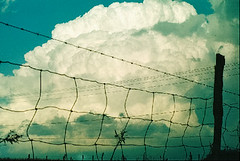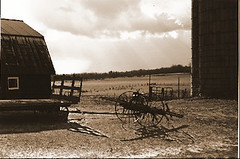El Laberinto del Fauno (2006)
Dir/Writ. Guillermo del Toro
w/ Ariadna Gil, Ivana Baquero, Sergi López, Maribel Verdú
First thing's first with a movie like Pan's Labyrinth (2006): You have to see it to believe it, and if you haven't already seen it, you'll need to remedy that as soon as possible.
It's very hard to go wrong when Alfonso Cuarón is involved with a project, but Guillermo del Toro (who directed this particular project) goes the extra mile to ensure that from beginning to end it is a work of integrity worthy of the passions and innocence of youth, the foibles of tyranny and the eternal struggle to find something pure and safe and lasting.
In short, he has created a classic film.
Those familiar with the fantasy genre will recognize that this film lies somewhere outside of the standard categorization, both in content and in context: set up like a folk tale that could easily have been taken from For Whom the Bell Tolls, our young heroine must brave the tasks set for her by a faun of the underworld despite the brewing storm of Francisco Franco's Spain. Caught between a stepfather whose fanatic loyalty to Franco's dictatorship parallels his indifference to his new wife in everything but to produce a male heir, Ofelia must accomplish what Pan sets her to do or face the consequences of her own mortality. And when the daughter of the king of the underworld has been charged with duties to prove her identity, she must arise to the occasion.
The terrific thing about a film like this is its universal scope. At all levels, it registers with deep and hidden truths about childhood and growing up and the constancy of humanity to maintain a struggle between good and evil, despite ages of evidence arguing that we should give it up. The allegory of the labyrinth operates not in the mists, though, but in the reality of never knowing what's right around the bend. Like any good coming-of-age tale, that's the abiding rule.
Fans of the fantasy genre may need to adjust their expectations a bit. Legend, The Dark Crystal and The Lord of the Rings -- even The Chronicles of Narnia (although the PBS version of that story still carries the brass ring) -- each have their specific places in the movie-going consciousness. Even films with varying production values and themes, such as Conan the Barbarian, Conan the Destroyer, Red Sonja, Krull and Clash of the Titans can say roughly the same thing. This film, imbued with life by incredible writing prowess and a childlike savvy, leaves the clichés and typicalities to the past, beating a new path for the international scene.
And while one well-made film's not enough to go on -- to get your hopes up that this will start a cultural revolution -- it's still some pretty exciting stuff.















20 Comments:
*spoilers*
Hmm, I did not like this film and it's partly wrapped up in what my expectations were coming in.
I felt like there wasn't enough energy invested in the fantasy world, that so much of what we witnessed onscreen was the brutality of the captain. The gore of those scenes were not offset by an equally dynamic fantasy world. Basically, what we get is a few snippets of fantasy in what is otherwise an overwhelming pessimistic war-time, family drama in which there is no hope, no light for the girl. The ending upsetted me even more, because in dying to achieve an full transportation in the fantasy world, Del Toro seemed to be saying that hope is not possible in life, that imagination can only take us so far before the brutality of the world overcomes. What a bleak, bleak vision!
Additionally, I did not care for the faun character, who in some ways seemed to be an extension of the captain, another patriarchal figure with unreasonable expectations.
So I admit that I was expecting Pan's Labyrinth to be more of a fantasy. If an "adult" fantasy means more gore and less fantasy, then I guess usually, you can count me out. But furthermore, as I say, I feel like the message and themes were extremely troubling for me to deal with. When you put a girl in a situation where there is no way out, that seems to me to be more sadistic than anything else. And if that's real life, then I'd rather not see it.
The way that I describe the movie though, you'd figure that you and I had seen two different movies! Maybe we did.
Tyler--
I'm going to chalk this up to the fact that we are very different human beings with very different experiences, and with one very glaring major difference: gender.
I am a Northeaster, a first generation American on her mother's side, who grew up loving a lot of books that most people my age have never heard of, and this reminded me of the best of those readings -- James Thurber's The 13 Clocks and various folk tales from Russia and Africa and beyond...
Since you have never been a little girl and never come of age as one, I could see how the immediate connection might be lost on you ;)
By the way, have you read For Whom the Bell Tolls? I think that, like a lot of literature of the day, that bleak vision has deep roots in what makes humans so fascinating: our honesty (or inability to be honest), our frailty (an illusion), our dogged will to survive that often seems so futile...
Del Toro's allegory for the Spanish Civil War, a war that can hold endless fascination for its scholars, does not pull any punches: life is brutal, even for little girls.
Sadistic? Mmm...look again.
Realistic, honest, and loving in a "tough love" sense, yes...but would you really rather be lied to?
The Pan father-figure - Yes. I'm glad that you picked that out. he represents everything that the stepfather can not give her: challenges to her character and growth. A lack of naivety that the world fixes itself or is constant and static and controllable.
Wonderful.
Are you a fantasy fan, by the way? You mentioned expectations, so I'm curious as to what those were.
Mmmmmm, no I don't agree with you that it's a matter of me not having come-of-age as a girl. I don't think that's the reason why critics of both genders rave about this movie, nor why I dislike it. For example, The Spirit of a Beehive is a story about two little girls in the Spanish Civil World and how one of them escapes into a world of fantasy and I absolutely adore that film.
Yes sadistic, no love, no honesty. If honesty means fascination with brutality, then again, count me out. The only love I see existing in this movie comes from Mercedes, who actually seems to care about Ofelia, and who wants to help her in her present situation.
The faun has no love for Ofelia: he is bent on her completing his tasks on his own terms, and it seems like the only thing he is REALLY interested in is her fulfilling a prophecy. He doesn't care about her as a person.
My expectations were mostly set up by the marketing scheme of the movie. From the posters and trailer, I got a sense that I was going to see an Alice in Wonderland-like tale. Unfortunately for Ofelia and for the viewer, Ofelia gets stuck going down the rabbit hole and we can only look at what might have been a marvelous movie below, as we witness the captain take chunks out of her exposed bottom with some instrument of torture.
Sickening.
I know I'm taking a hard line on the film, but the more I think about it, the less I like this film. Of course, I should see it again.
I am a firm believer in watching a film twice or reading a book twice before saying that I have, y'know, really seen it or read it.
i left a comment on your Barry Lyndon review, by the way.
(on your blog)
Well, I agree, but my first viewing impressions are still valid.
they're a valid part of your viewing experience, and i certainly respect your viewpoint, but you haven't convinced me that you have the kind of grasp of the material that would invite appreciation.
and i do still think that not being a girl makes a tremendous difference.
...that you immediately declined any real questioning of that or exploration of that very unique viewpoint says a lot.
a lot of people in the theatre were horrified by what they saw. i even heard a fifty year old woman scream, so i understand that you weren't able to get past certain aesthetic choices, but that doesn't render those choices null. They weren't pulled out of the ether; they were artistically evidential of the allegory's dimensions.
If learning about film means looking only for movies that support our own tastes and limited experiences, it's a pretty good bet that you're not going to learn a lot.
And that's been one of the hardest lessons for me to learn, but now I see it as film criticism 101.
This comment has been removed by the author.
Johanna, I think you're being incredibly unfair with your accusation of close-mindedness. I responded thoughtfully to your suggestion that I would need to be a girl to grasp the film. I find that suggestion absurd for reasons I stated that you did not respond to, that I have loved films that have a similar girl-coming-of-age point of view. Also, that both genders have loved the film tells me that this film is a film not just about a girl-coming-of-age, but about a child-coming-of-age, and its appeal lies in that universality you spoke of in your initial post.
You're right, I did not like the presentation of the film, and I did not like the message behind the film, but I didn't claim to have an objective point of view from the outset. I was trying to express how I felt about the film and trying to figure out how what I saw lined up with the way I felt. Isn't that how experiencing film happens first and foremost? We react to a film and try to justify our reaction.
quote: "If learning about film means looking only for movies that support our own tastes and limited experiences, it's a pretty good bet that you're not going to learn a lot."
Yeah, your reminder of this fact is unnecessary. Of course film is about expanding our worldviews. Great art speaks across cultures and worldviews, enriching our own as we encounter it. I understand that I would need to look past the violence to get a more complete picture of the film, but at face value, it did not speak to me, and I think me exploring why that is is still important and valid.
To be honest though, I still don't think you've expressed much as to why this film works so well objectively. You've categorized it and made literary references and noted why it appeals to you personally (because of your childhood reading experiences), but, to use your words, you haven't convinced me that you have a grasp on the material that would invite dissent.
I would like you to go further into this cleverly phrased sentence: They weren't pulled out of the ether; they were artistically evidential of the allegory's dimensions.
What is it about this particular allegory as you say (would it be correctly defined as an allegory as opposed to a fairytale?) that lends itself to Del Toro's violent and bleak vision of the world?
To state in a different way, I think you seem to be saying that the violent presentation and focus on the patriarchal cruelty is a matter of Del Toro's worldview, and that for me to be closed off to the violence and narrative focus is to be closed off to this worldview. I would invite you to explore these artistic choices a little more fully. Make an argument as to why these line up. Or make another argument.
Okay. Calm down.
Because I believe it best to start with a definition when attempting to answer a difficult question, this is courtesy of dictionary.com, as I am not somewhere where I can grab my trusty Oxford dictionary:
al·le·go·ry
1.a representation of an abstract or spiritual meaning through concrete or material forms; figurative treatment of one subject under the guise of another.
The war acts partly as the metaphor for the psycho-sexual awakening of a girl in Pan's Labyrinth, a treatment that could (and will) easily lend itself to much study and interpretation over the years. The reality of being female -- the radical change the glands go through and the introduction of menstruation in the body, which has been referred to as sadistic, a curse, no? -- tends to invoke a lot of violence.
For some reason, and this isn't something that I have studied and can only really touch upon, but a lot of art over the years has been made trying to capture epic moments that often feel like retaliation for the "frailty" of women -- in fact, wars have often been justified as a defense of the defenseless...which is an interesting irony since women and children are often considered to be the victims of war.
What this film does is to push all of this to the side, all of these assumptions about what women are and are not capable of and what expectations we should and should not have of them. The fact is that women are on their own...but, of course, we aren't taught that as little girls.
You mention Alice in Wonderland which is a wonderful, but simpler allegory. In that case, the story involves a girl but could have just as easily been a boy -- except for the popular conceptions of the time.
Alice slows as she progresses down the rabbit hole and notices things and learns to assimilate the world around her very differently, and to take note of its silliness, something that could have just as easily been performed by anyone growing up...and I love Lewis Carroll, but the heroin (or opium, I forget) may have dulled his brain a bit, and while some very colorful characters pop up in his world, they were essentially pulled out of the ether of his drug-induced consciousness and imagination.
Del Toro does not simply paint a colorful and pretty picture that everyone can put in their pocket. He could have, but instead chose to tell a story using the truly scary world of the unknown -- the fantasy world, complete with all of its unpredictable horrors -- to show this girl caught in the throes of growing up without a strong mother figure and without a strong father figure, either.
In a way, when this happens, we have to raise ourselves. In this case, the power of her imagination produces Pan, who sets her tasks that can essentially order the horror going on around her into a digestible, manageable -- conquerable -- form. By completing these tasks, she remains true to herself and her integrity as a human and spiritual creature, rather than letting the horrors of the atrocities going on around her distort her, mutate her into something she is not. Each of the figures she encounters has been so distorted by these horrors, and it is her charge to set these things aright.
By using the Spanish civil war as the guise of her awakening, Del Toro invites us to understand that this unrest is a natural reaction to a power struggle, a skirmish between spiritual essence and bodily reality. No one can control what occurs within the body any more than any one person can control what is going on in the world -- it is always an illusion, and yet the struggle for control is ever present.
When I say that you were unable to make the "immediate connection," I meant it. Your body does not bleed. You will never face birth or a miscarriage. These are violent acts of nature. There are reasons why the female threshold of pain is nine times higher than the male's, and that has probably colored this conversation more than either of us may be able to quantify.
Pan represents the depths of the young girl's psyche, her ability to recreate reality, to make sense of it. Her stepfather represents everything that feminist rhetorician scholars refer to as violent: the imposing of silence, and the use of language and actions to make people change.
Without Pan, she would be lost and unable to stand on her own.
Johanna, this is a well-written and interesting reading that takes ideas that you care deeply about and shows how this film might address those concerns on a larger narrative level.
quote: "When I say that you were unable to make the "immediate connection," I meant it. Your body does not bleed. You will never face birth or a miscarriage. These are violent acts of nature. There are reasons why the female threshold of pain is nine times higher than the male's, and that has probably colored this conversation more than either of us may be able to quantify."
What you're not mentioning though is that this film is written and directed a man who will never experience childbirth. How is it that Del Toro is able to capture this violence of a girl's sexual growing pains so well if he does not to some extent understand or at least appreciate this pain?
Quote: "Pan represents the depths of the young girl's psyche, her ability to recreate reality, to make sense of it. Her stepfather represents everything that feminist rhetorician scholars refer to as violent: the imposing of silence, and the use of language and actions to make people change.
Without Pan, she would be lost and unable to stand on her own."
See, I don't agree with this completely. I think it is Mercedes who offers a different way to the violence Ofelia sees around her. Mercedes is loving, and shows Ofelia how to love, even when her mother or father can't, through the pragmatic example she sets by supporting the rebels and by loving her brother and fiancee (is it a fiancee) and fighting for them. I see Pan, as I've said, as another demanding, patriarchal figure that shows no concern for her as a person. Pan only sees Ofelia as an instrument in the fulfilling of the prophecy which he is the gatekeeper for. Ofelia's sexual and emotional maturation? Pan could care less about Ofelia's actual needs. It is Mercedes who would actually save Ofelia, who would actually nurture and care for her if given the chance. The breakdown of the Pan's character in providing a meaningful contrast to the Captain for me is the signal that this movie does not work. Pan is not there for her! He pops in and out of the narrative to scold her for not moving forward with his mechanical tasklist.
I wanted to comment further on something I said in my first post. Del Toro does not establish an equally dynamic fantasy world to offset the brutality of the real-life situations, something I think he needs to do to fulfill the allegory. I think the most striking example of this is at the end when Ofelia walks up to her parents on their pedestals in the middle of a large room with the crowd and everything. There's an empty throne for Ofelia. What is she supposed to do here? What is she supposed to feel? Here are two parents who have played no role in her life and she's supposed to go up and sit by them and hear the cheers of a random crowd. Is this in any way a release of all the tension we've had in the movie up to this point? Is this in any way a payoff for the death of Ofelia, or for the pain and suffering she has witnessed and experienced? Is this in any way a dynamic fantasy world? An austere throneroom and a crown and a couple of absent parents manifest on an esoteric and monarchical plane? This cold and uninspired ending in no way balances the fantasy with the brutality of the images we've previously experienced. I'm not sure what to make of this, except to say that it is unsatisfying.
Suffice it to say that I think Del Toro has a hard time balancing the various genres he's playing with here, all under the guise of the allegory as you say! I think this film would've been more powerful for me had the lackluster fantasy elements not been introduced. The tone of the film is uneven as a result, which I think is what I found so unsettling. The faun is supposed to bring all of this together for us, to bridge the real world and the fantasy world, but he fails to do so because of the troubling moral implications of his patriarchal nature and because, actually, I find him to be relatively drab visually. He fails to bring any sense of magic to what might have balanced the genres and the film (in general) out.
How does the ending for you play into your reading?
One thing that your reading lacks is a concern for the more technical aspects of what Del Toro is doing aesthetically. Although I cannot comment too much on this side of things, I did find the film to be beautifully shot on the whole. One of the upsides to a film that I found troubling narratively.
I wasn't bothered by the ending of Pan's Labyrinth, or by the uncaring and confusing fawn. The nuanced complexity of her potential rescue squad showed us that Ofelia has had to think for herself, and never follow anyone, or any fantasy, blindly (which would be giving in to facism).
I thought perhaps her sense of being fullfilled/rewarded upon the moment of death was a type of self-protection to ease her real-world suffering. I admired her for her ability to imagine herself a princess, even as she was bleeding and collapsing.
I didn't actually believe that the underworld, or her empty throne were real. I thought her mysterious and distant parents were like Gods. We don't know them. We might never know them. Who knows if they're real or not?
Speaking of uncaring and confusing fawns, I just saw "Institute Benjamenta," "The Piano Tuner of Earthquakes" and two series of short films, all by The Brothers Quay at the PFA in Berkeley. Now, those are fine examples of painfully violent, confusing, inspiring, ridiculous, amazing, hypnotic, otherwordly works of twin imaginations.
The Piano Tuner of Earthquakes came to Pittsburgh's Three Rivers Film Festival and would have been high on my list, but I had to miss it...but it's in my queue (I think) and I'll be sure to add Institute Benjamenta also, if I like the first as much as I think I will.
Odd. Like you, I didn't find the underworld to be a reality either, but not being an overly narrative-driven person, that's not so surprising. It's not that I didn't care, but the importance of whether or not she was truly a princess of the underworld took a backseat to the larger idea that by overcoming all of these obstacles, she had attained a spiritual immortality that surpasses all things earth-bound...the human slavery to greed and power being the specific examples.
It also suggests that if we must live in a world ruled by illusion, then surely we can do better than the one we have going on in Franco's Spain. Socialist or not, spiritual or not, that's the emphasis that Del Toro's providing here.
In this sense, the ending provides ideal maturation of the story's underlying principle -- that unless you are lounging around a fanciful Valhalla, that conflict is necessary to growth and greater understanding.
In a psychological way, the ending manifested the perfect thing a young girl might tell herself to keep her eyes focused on what virtue she recognized as right, especially in the face of such horrific evil. In a spiritual way, though, the ending tapped home the idea that humans can and do rise above the material world in an effort to attain a state of grace.
Any good Buddhist will tell you, though, that Enlightement is fleeting ;)
Del Toro is a middle-aged man who has seen a thing or two in his time, and I'd love to read or hear an interview with him about this in depth. I wouldn't be at all surprised to discover ages'-worth of conversation with females about what that's like...after all, it's not like he didn't put a lot of time and effort -- real blood, sweat and tears -- into making this film.
That's another part of film criticism that's important but mainly overlooked: the real effort put into a film, which is not an easy thing to make, often gets lost in the deconstruction. When I meet a critic who can't even tell me the fundamental critical analysis of the story versus the plot, I lean away.
As for what you're trying to imply about love, Tyler, I'm not so sure that we're talking about the same thing. Mercedes' love is a maternal one, but that is only one kind. There are many kinds of love that we need for our growth and development, and maternal love is only one of them. Otherwise, why would we ever bother with the weening process?
"One thing that your reading lacks is a concern for the more technical aspects of what Del Toro is doing aesthetically. Although I cannot comment too much on this side of things, I did find the film to be beautifully shot on the whole."
That's why I mentioned that I had thrown this together for a small paper, one with an audience that doesn't endure such talk. But I choose different aspects of different films to really get into, anyway, and I almost never discuss the technical aspects of a film as complex as this after only one viewing in the theatre.
As someone who took a hundred screen shots of Barry Lyndon and then wrote a very long but still very surface study of the film, perhaps you can understand why.
And just because you're looking for it, and you can't find it, doesn't mean that a writing is necessarily lacking. I posted this review, like the one on Volver in this manner in order to engage conversation, not in order to write something so seemingly complete that there was very little left to say on the matter.
You really should read For Whom the Bell Tolls, both as a writer and as a supplement to the film, whether you liked it or not.
Quote: "And just because you're looking for it, and you can't find it, doesn't mean that a writing is necessarily lacking. I posted this review, like the one on Volver in this manner in order to engage conversation, not in order to write something so seemingly complete that there was very little left to say on the matter."
Haha. Ok Johanna. I'm not attacking your viewpoint or writing or your person, so I'm not sure why you've felt the need to take subtle potshots when I'm simply trying to engage in conversation as well (albeit with a different take on the film). At any rate, no harm done. Cheers.
I wished to make myself clear, of course.
Mission unsuccessful.
This cold and uninspired ending in no way balances the fantasy with the brutality of the images we've previously experienced. I'm not sure what to make of this, except to say that it is unsatisfying.
Like johanna and sisterrye, I thought that the ending was a perfect justification for the film, which starts with Ofelia on the ground, bleeding. After that and some explicatory voiceover it flashes back to the rest which, depending on your interpretation, could make the entire film a true fantasy--meaning not that fantastic things happen but that fantastic things are imagined as a means of dealing with a difficult situation (impending death). I think the film affords more than one interpretation, though I'd agree that it's a problem that some viewers don't find them all equally fascinating (since I do think Del Toro was aiming for ambivalence).
That's an interesting thought about ambivalence, tuwa. I had it in mind that Del Toro's purpose was to be as realistic as possible, meaning that by using a fantasy vs. horror world, we could see just how important negotiation becomes in order for children to learn to navigate as adults. I also felt that the violence was perhaps even a response to American naivete, which many foreigners dislike and distrust, especially our Southern allies, I've noticed.
But I could see how he might want to leave the viewer's judgment a matter of critical concern, you know, and not play upon sympathy or other emotions any more than was possible for Ofelia's character to take shape, as that would allow the individual audience members to decide for themselves just what the repercussions to their consciousness bodes via this translation. And that's something that I like very much.
Now that's interesting. I think a viewer would be hard pressed to watch the film and fail to relate it to the political climate in Spain at the time of the film. Yet in watching it I completely failed to consider whether the film was meant to comment on any politics beyond its explicit setting, or if my interpretation were implicitly American. I guess that's a long-winded way of saying film criticism is not my forte. o_O
ha ha...but you takes such a good picture of stairs;
I was talking with ted pigeon about the Spanish Civil War aspect of the film, and what I said was this:
I felt that this was a coming-of-age film primarily, and that Del Toro used the violent turmoil of Franco's Spain as the metaphor for his major allegory of that awakening...which made so much sense to me, to use that ideological rupture as a figurative lens for growing up.
Our local A&E, The Pittsburgh City Paper, ran a review that has influenced some of my thoughts...but this statement bothers me:
"If you're a thinking-cinema sort, you'll likely be tempted to keep your brain keyed to making connections between the allegorical and the historical. But I recommend that at least on first viewing, you simply absorb the film, letting your mind steep in its various overlapping meanings."
For one thing, I always watch a film or read a book the first time for enjoyment--the second for comprehension. But Del Toro's direction doesn't allow for a lot of leeway. You can be disgruntled by the violence or thrown off by the uncertainty that she's truly a daughter of the underworld, but he's so busy presenting you with these elements that you're keyed into them not by default but on purpose. My mind flitted to Hemingway's novel, but the read only enriched my viewing. It didn't detract.
The film was too solidly made, I think, but I'll have to watch again before deciding that.
Post a Comment
<< Home